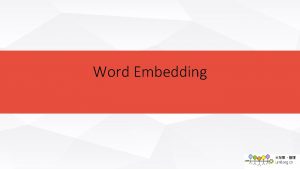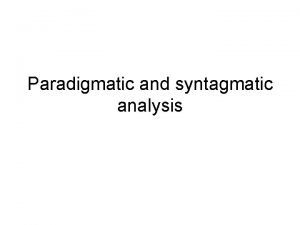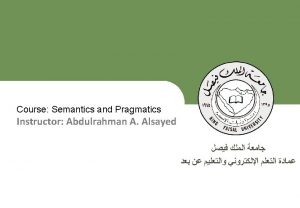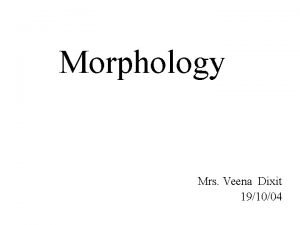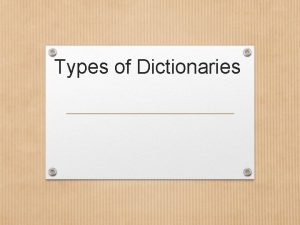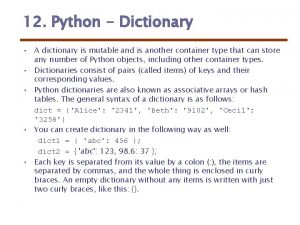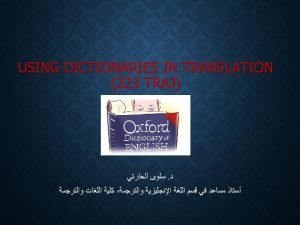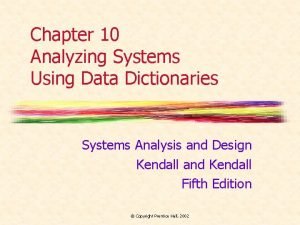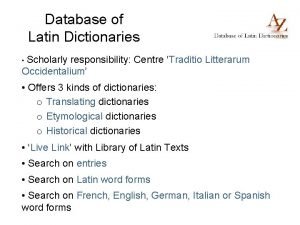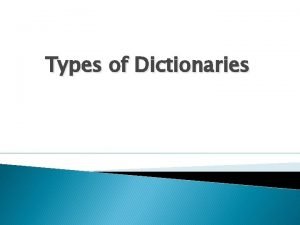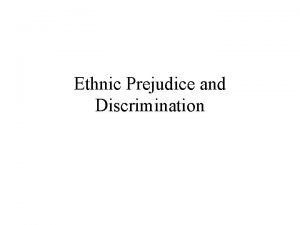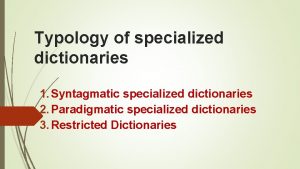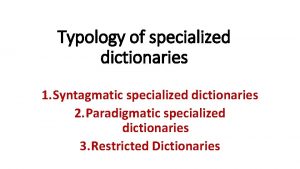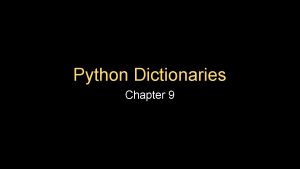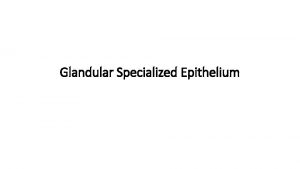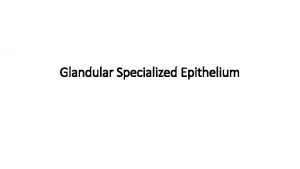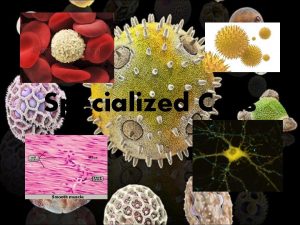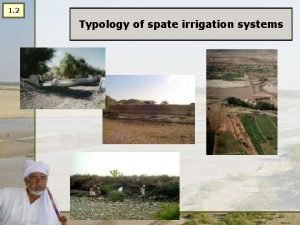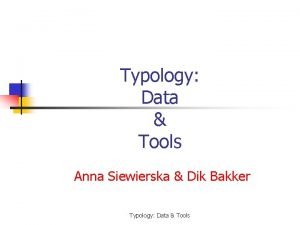Typology of specialized dictionaries 1 Syntagmatic specialized dictionaries










- Slides: 10

Typology of specialized dictionaries 1. Syntagmatic specialized dictionaries 2. Paradigmatic specialized dictionaries 3. Restricted Dictionaries

Syntagmatic specialized dictionaries • They are concerned with the relationship between the lexical items and other items with which they are combined. • 1. Construction dictionaries • 2. Collocation dictionaries • 3. Idiom dictionaries.

Construction dictionaries • Specify for each lemma (headword) the kind of complement that are syntactically possible. • They are primarily concerned with verbs and they specify the construction of nouns and adjectives. • There are mainly three types of complements: 1. A subject complement 2. An object complement 3. A verb complement

1. A subject complement: It follows a linking verb. It is normally an adjective or a noun. e. g. A glacier is a huge body of ice. A glacier is beautiful but dangerous at the same time. 2. An object complement: It modifies a direct object. It can be a noun or an adjective. e. g. The convention named Dogbreath Vice President. (a noun) (The noun Vice President complements the direct object Dogbreath) The clown got the children too happy. ( an adjective) (The adjective happy complements the direct object children) 3. A verb complement: It is the direct or indirect object of a verb. e. g. Amal left Sarah all her money. ( Both money [the direct object[ and Sarah [ the indirect object[ are said to be the verb compliments of the sentence)

Collocation dictionaries • Specify for each lemma (headword) what words tend to appear together with it in word combinations. e. g. keep a promise NOT hold a promise do your homework NOT make your homework make a cup of tea NOT do a cup of tea • Example: Oxford Collocations Dictionary for Students of English

Idiom dictionaries Idioms are group of words in a fixed order that have a particular meaning that is different from the meanings of each word on its own. e. g. beat around the bush (not speaking directly about the issue) back to the drawing board (when an attempt fails and it’s time to start all over) • Example: Cambridge Idioms Dictionary

Paradigmatic specialized dictionaries • They are concerned with the relationship between lexical items and other items for which they can be substituted. • This substitution may concern either the content side or the expression side: • 1. Content-paradigmatic dictionaries • 2. Expression-paradigmatic dictionaries

Content-paradigmatic dictionaries • 1. Synonym dictionaries: they are of two types: • Cumulative synonym dictionaries: they group together words having (almost) the same meaning, the user is left to choose the most suitable synonym. ( brave : courageous, plucky, fearless etc) Example: Longman Synonym Dictionary • Distinctive synonym dictionaries : They provide the contexts in which each particular synonym is preferred. Example: Webster’s New Explorer Dictionary of Synonyms and Antonyms 2. Antonym dictionaries: They are less common They are often combined with synonym dictionaries 3. Thesauri (plural of a thesaurus ): Words are grouped together according to conceptual connection, regardless of part of speech Example: Roget’s Thesaurus of English Words and Phrases

Expression-paradigmatic dictionaries • They may be based on the spelling or the pronunciation of words. 1. Based on spelling: Reverse-order (final-alphabetical dictionaries): They are sorted according to the last letter of the word, then according to the last but one, and so on. Words that have the same endings are listed next to each other (e. g. words that have the same suffixes) (courageous, advantageous, religious) 2. Based on pronunciation: Rhyming dictionaries: They group together words whose endings are pronounced in the same way.

Restricted Dictionaries • Technical dictionaries (terminological dictionaries) They are compiled according to principles of terminology They deal with the technical language of a subject field (medicine, law, literature, linguistics etc. )
